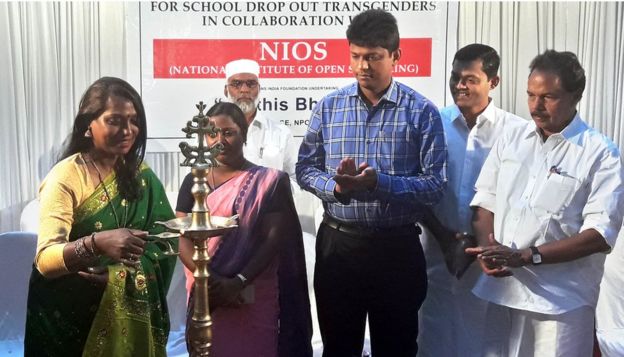
In 2014, India’s Supreme Court, recognized transgenders as a third gender and ruled that they had equal rights under the law in the country, estimated to have two million transgenders. The landmark ruling provided members of the community with rights to marry, inherit property and also be eligible for quotas in jobs and educational institutions. However, despite the Apex Court ruling, social stigmatization, discrimination and exploitation had marred development, to an extent where basic human rights were denied to transgenders. They continued to be disowned by their own families, denied jobs, forced into sex work and begging to earn a living.
Trans-Human Rights??
“It’s boiling down to ensuring dignity for transgenders but how can we have that as long as we are having Section 377?” – Akkai Padmashali, a prominent transgender activist in Kerala.
Section 377 of the Indian Penal Code was enacted in 1860 during the British rule of India. It criminalizes sexual activities “against the order of nature”, arguably including homosexual sexual activities. In 2009, the section was decriminalized with respect to sex between consenting adults by the Delhi High Court but nevertheless was not amended or repealed. In 2013, the Court held that amending or repealing Section 377 was a matter that should be decided by the Parliament and not the judiciary. However, earlier in 2016, a three member bench headed by Chief Justice of India, T.S. Thakur, that the curative petitions submitted by the Naz Foundation will be reviewed afresh by a five-member constitutional bench.
But while the country debated, Kerala became the first state to unveil a transgender policy, aiming to provide a platform for voicing the rights of equality, dignity, development and expression for the community. During an inaugural ceremony of the first International Conference on Gender Equality, held near Kovalam, State Chief Secretary Jiji Thomson, handed the ‘State Policy for Transgenders in Kerala 2015’ to Akkai Padmashali. The policy, although a first step, has been welcomed by many. At a time when most transgenders are still forced into begging or the sex market, the policy, aspires to end social stigmatization and discrimination while enforcing constitutional rights of transgenders.
Education has always been of prime importance toward spreading awareness and in line with the goals of the transgender policy, Kerala is all set to make history again. On December 30, 2016, Kochi, a major port city in Kerala, geared up to inaugurate India’s first transgender school, Sahaj International School. The event was inaugurated by transgender rights activist and artist Kalki Subramaniam, with students selected from different sections of the community, including a migrant and a disabled person, at Thrikkakara in Kerala’s Ernakulam district. A residential school, Sahaj, will be led by six transgenders working with the TransIndia Foundation and accommodate 10 transgenders under the National Open School system. It will provide education equivalent to class X and XII and include training for soft skills, stitching, organic farming, oration and personality development. V.S. Raveendran, regional director of NIOS, also mentioned that the school would soon be a special accredited institution of NIOS.
Inauguration of India’s first transgender school
Like most initiatives for change, this feat was not easy either. Even finding a venue for the school had become an ordeal, but many like transgender activist, Vijayraja Mallika, who also heads the school, never gave up. “We approached some 700 people and 51 households, and all of them turned us away. They seemed to think that we were looking for space for prostitution,” Ms Mallika told the BBC. However, despite opposition by many, there are still some in society who are coming forward to join hands for the cause. Today, the school has the support from a pool of 60 trainers including doctors, teachers, social workers and engineers, who are all committed to make their contribution to help strengthen the community’s stand in society.
“Today is an important day, a historical day, historical time… An important day, time we are opening a learning center for transgenders. Nowhere in India it has been initiated so far. That way this will be the pioneer for many other organisation in different states, a model to follow. The most important tool for the underprivileged, discriminated marginalised, oppressed community is education, because education brings light, knowledge, truth and confidence. Education brings the path to the beautiful life, because transgender people like me, we are abandoned by our families. Most of our biological parents don’t accept us and because of this reason most of us are left on the street and forced to beg and do sex work. This has to change if we have to change the destiny of those people who were abandoned by their families and who had lost opportunity to get educated,” Kalki said (Indian Express).
The school is initially functioning with the help of few Sponsors, but later, government aid may also be sought to support the functioning and growth of the school. Christian organisation pro-Life sector and National Open School have also come forward to support the initiate along with a pool of teachers and social workers who have volunteered to teach classes. Others such as Muhammad Y. Safeerulla, the district collector, have also committed the administration’s full support for the welfare of transgenders.
UN ex-Secretary-General, Ban Ki-moon in India
Stigmatization of the community, have always made it difficult for transgenders to be included in the mainstream and seek the fundamental rights. Policies and schools such as this would help end discrimination and help transgenders get education and find security, sustainability and more importantly, their human rights. The Kerala school is thereby all set to be a model, a trendsetter and an example for others to follow. Ms. Mallika informed the BBC, that once successful, the facility would be expanded and admit more people across the country and would help transgenders become eligible for decent jobs and a dignified living.
Image source: BBC, lgbthealthwellness.com, UN Free & Equal
Similar Articles

